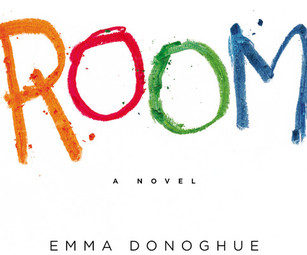Note: This post is not about faking orgasms. I will say, however, don’t fake an orgasm. It’s a lie, and there are plenty of ways to find pleasure that don’t involve orgasm. Experiment. Find what works. Have good, honest fun. Anyway. On to the real subject.
I recently read Room, by Emma Donoghue. It’s an unexpected thriller, by which I mean, look at that cover: colorful crayon letters in a child’s handwriting. And the first few paragraphs:
Today I’m five. I was four last night going to sleep in Wardrobe, but when I wake up in Bed in the dark I’m changed to five, abracadabra. Before that I was three, then two,, then one, then zero. “Was I minus numbers?”
“Hmm?” Ma does a big stretch.
“Up in Heaven. Was I minus one, minus two, minus three—?”
“Nah, the numbers didn’t start till you zoomed down.”
“Through Skylight. You were all sad till I happened in your tummy.”
“You said it.” Ma leans out of Bed to switch on Lamp, he makes everything light up whoosh.
See? A bit odd with the whole “Wardrobe” thing, but other than that, it’s just a kid on his fifth birthday, in his own voice.
Point is, it doesn’t introduce itself as heart-pounding, anxiety-inducing, adrenaline-spiking material. But one night, as I was settled in bed with my dog and my cat and my stuffed animals and my tablet, reading the Kindle version, that’s exactly where I was—heart pounding, anxious, flooded with sympathetic adrenaline. It was climactic … except that I was only half way through. I won’t give details, but I’ll say this: story arcs, particularly traditional drama arcs, often have what’s called a false climax. Here’s an example I’m inventing:
Character’s name is Joe. Joe’s estranged cousin, Tom, sends him a package and asks him to deliver it to a guy who will be arriving at the bus station, because Tom doesn’t know the guy’s new address. Don’t worry, Tom assures Joe—it’s not drugs or anything. Just something he meant to give this guy before he left town. Joe asks for the guy’s name, but Tom says the name doesn’t matter—just look for the guy in the Dodgers cap.
So Joe goes to the station, feeling weird but wanting to be rid of this package. As he’s driving, though, he realizes he’s being followed by another car. No big deal, he assures himself—the bus station is a common destination. Only he parks, and the other car parks right next to him. He locks the doors, doesn’t shut off the engine. Two people get out of the other car. One knocks on the passenger window, and the other comes around to the driver’s side, flashes a holstered gun. Just as Joe is about to unlock the doors, the guy with the gun seizes up, falls to the ground. A guy in a Dodgers cap stands behind him with a taser and grabs the fallen man’s gun. He waves it at the passenger side guy, who raises his hands, retreats into the other car, which squeals away.
The guy shouts, “Open up,” and Joe does. The guy leaps into the car. He is Tom’s contact and he tells Joe to drive anywhere, just somewhere that’s not here. He explains: The package contains evidence regarding Tom’s father’s death, implicating one of the men in the other car as attached to that and several other murders. Dodger’s cap guy asks Joe to take him to the nearest police station so he can get in touch with the feds, and as he’s getting out of the car with the package, he gives Joe a twenty and thanks him for the ride.
Joe goes home and uses the twenty to order himself a pizza. He cracks a beer, thinks of giving Tom an angry call, decides he’d rather just be done with it. We, as readers, totally sympathize with that. Thing is, there are still 200 pages left.
Poor Joe.
It’s like watching an hour-long cop show and seeing the criminal arrested, then looking at the clock and seeing you’re only 27 minutes in. It’s like seeing the soulmates’ wedding and knowing there’s an unfired gun waiting at the reception hall. It’s like finishing a research paper and realizing there’s a gaping hole in your argument.
(You can take the girl out of academia, but you can’t take the academia out of the girl.)
In ways, the false climax is more painful than the tension leading up to it. At least when we’re all heart-poundingly anxious and flooded with adrenaline, the characters are on the alert. It’s when they let their guard down while we know better that the tension dials up to eleven. The most painful sort of dramatic irony, I think, is that following a false climax.
Here’s what I’m saying: I want to knock that beer out of Joe’s hand and slap him across the face with a slice of Meat Lover’s Supreme. And I think part of what makes any piece of writing effective is creating that desire to wriggle between the printed lines and get in ourselves. Maybe it’s being romanced by a millionaire or riding a dragon; maybe it’s avenging an unjust death or reuniting with a long-lost father; maybe it’s being able to intervene when you know something a character doesn’t.
Here’s the other thing I’m saying: Seriously, don’t fake an orgasm.
